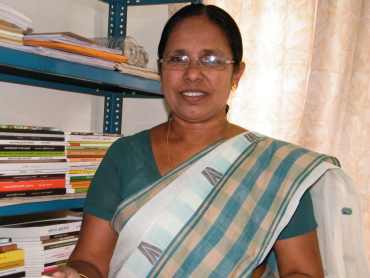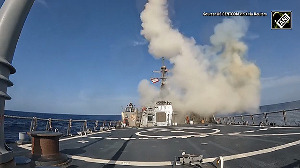
The All India Democratic Women's Association, a wing of the Communist Party of India-Marxist, was one of the first organisations to take up the case of the Suryanelli gang-rape victim in 1996.
Seventeen years on, as the case continues to create shockwaves across the nation, K K Shailaja, the general secretary of the AIDWA, in an exclusive interview with rediff.com’s Shobha Warrier, talks about the plight of the victim and the alleged involvement of Rajya Sabha deputy chairman P J Kurien who was issued a notice by a Kerala court in the matter on Wednesday.
How did the AIDWA get involved in the Suryanelli case?
The victim, who is now known as the Suryanelli girl, disappeared on January 16, 1996. On January 17, her father registered an FIR at the police station, saying that his daughter was missing. When this appeared in the newspapers, we got in touch with the Idukki unit of the AIDWA and asked them to find out more details. That was how we got involved in the case.
Was the father of the victim in any way associated with the CPM then?
No, he had no connection with the party. He was a poor, lower middle class man with a minor job. We, at the AIDWA, decided to get involved because it was the case of a missing girl. When we learn about any injustice meted out to women, we try to help them and we don't look at party affiliation.
Were you personally involved in the case then?
At that time I was only a state member. It was a collective decision of the association.
Though the father filed a complaint the very next day after the girl went missing, the police did not do anything for 42 days. She was taken to many guesthouses and hotels in the state, yet the police could not trace her. When she appeared after 40 days, it was not the police who found her. She was left on the way to her house by those who took her. She was in a very bad condition then. So, we were quite unhappy with the way the police handled the case.
The 2005 high court verdict, which was stayed by the Supreme Court this year, accused the victim of not trying to escape from the clutches of the people when she was taken to different places. When AIDWA met the girl, did you ask her why she didn't try to escape?
Yes, we did ask her. In fact, after the high court verdict specifically spoke about her not trying to escape, I asked her, 'Why did you not try to escape from them in those 42 days?'
She told me, “Aunty, they always moved me from one place to another in closed vehicles and even if I howled, nobody would have heard me.”
She also told me that there were many people guarding the doors of the guesthouses when men raped her. She ran out of a second-floor room from one of the guesthouses and as she went down the steps, a man caught hold of her hair and slapped her hard. She fell unconscious.
She was always under full control of the people who abused her. They were cruel to her, threatened to kill her.
That judgment also mentioned her visit to a doctor for a sore throat and the judges wondered why she didn't tell the doctor about her condition…
What the victim said was that she was so scared to speak, as she was accompanied by her abductors all the time. She was also drugged most of the time. Even some of the doctors who saw her endorsed this. She was not in a position to react.
The doctor who saw her that day said that her throat was so bad that she could not talk. The doctors also had said in the court that her private parts were also infected and she was in terrible pain.
She told me again and again that she couldn't escape from their clutches. Just look at the situation from the victim's point of view -- she was just a 16-year-old and not an adult. She might not have been the courageous, smart girl who could think of ways to escape.
You know what she told me recently? She said, “Aunty, if I had the maturity that I have today, I would not have fallen into the trap.”
When you first got involved with the case, it was not a political case. How did (Rajya Sabha deputy chairman) P J Kurien's name crop up?
Yes, there was no political colour to the case when we first got involved. We only wanted to give justice to a girl. So many people abused her and she identified them at the identification parade.
She would talk about a gentleman in khadi clothes, but did not know who he was. When a photo of Kurien appeared in the newspapers, this girl identified him and told AIDWA that he was one of the persons who abused her. She was asked whether she was sure and she replied in the affirmative. She also said that because he looked so gentlemanly, she pleaded with him to rescue her.
That was how Kurien’s name appeared in the case.
We, at the AIDWA, had no intention to make it a political case or involve Kurien. We only wanted to take the girl's words seriously and book all the people involved.
So, when Kurien was identified by the victim, we strongly demanded that if a man of his standing was named by a rape victim, it should be probed. That was the only demand we made. But the special investigation team could not find any evidence against him. We, at AIDWA, or the Left Democratic Front (which at that time was in power in Kerala) did not say that Kurien should be included in the list of the accused. We only said that his involvement had to be probed as the girl pointed her finger at him.
Why did the AIDWA decide to file a petition directly in the Supreme Court?
Yes, AIDWA is one of the petitioners in the case. All the cases concerning rape are not getting justice and that is due to our slow judicial system. Even though the Supreme Court did not take up the case in eight years, we stood by waiting for a chance to intervene.
Instead of finding evidence in support of a girl who was gangraped, the high court judgment looked into the evidence that was in support of all the accused. Should it be done that way? Why was it that the evidence given by the doctor was not taken into account? What sexual pleasure, as the judgment said, the victim must have got when she was bleeding all over?
We are glad that the Supreme Court criticised the high court judgment and it was quashed and the bail of the accused cancelled. We, at AIDWA, consider this as a victory and it has given us confidence.
What is the demand of AIDWA now? Re-open the case?
There are two demands. Like the Supreme Court said, the case has to be heard again. We do not want any re-investigation because the case that has reached this far will lose its momentum.
We want the court to take up the issue of including P J Kurien as a separate accused. After the observation by the Supreme Court, the victim has said that not only the 35 people but Kurien also should be punished.
Is it the victim or the AIWDA who has come up with this demand?
It is her family. I went to her house and told her again, 'You are pointing your finger at a prominent political leader. Unless you are very sure and have strong evidence, don't do it.' She said, she could not forget him and was sure.
The victim wanted him to be included in the list of the accused. Even now, she says she gets the shivers when she sees him on TV.
Honestly, we do not want a man of his stature to be involved in such a case because this will make people lose confidence in the system.
The chief minister says the girl is reiterating what she had said earlier. Our question is, do you want her to change her testimony? She is only sticking to what she said in the beginning.
What is more important to the AIWDA now -- include Kurien's name in the list of accused or give justice to the victim?
The prime interest of AIWDA is to help the victim get justice. When we speak of justice, what we mean is, all the people who exploited her should be punished.
Do you see what happened to this victim as a social tragedy?
Yes, what happened to her is a social tragedy. As long as society feels that she can be exploited for pleasure such tragedies will continue to occur.
Image: K K Shailaja, general secretary of the All India Democratic Women's Association, Kerala state unit | Photograph: Shobha Warrier











 © 2025
© 2025